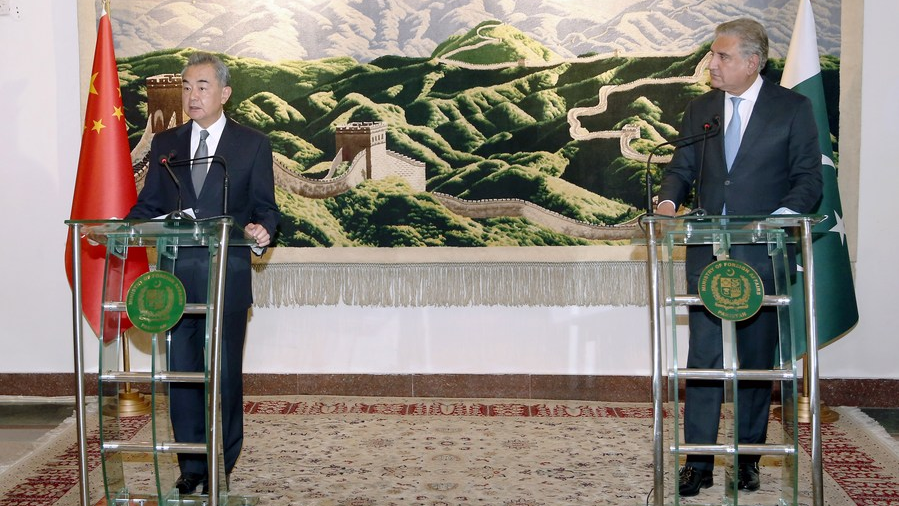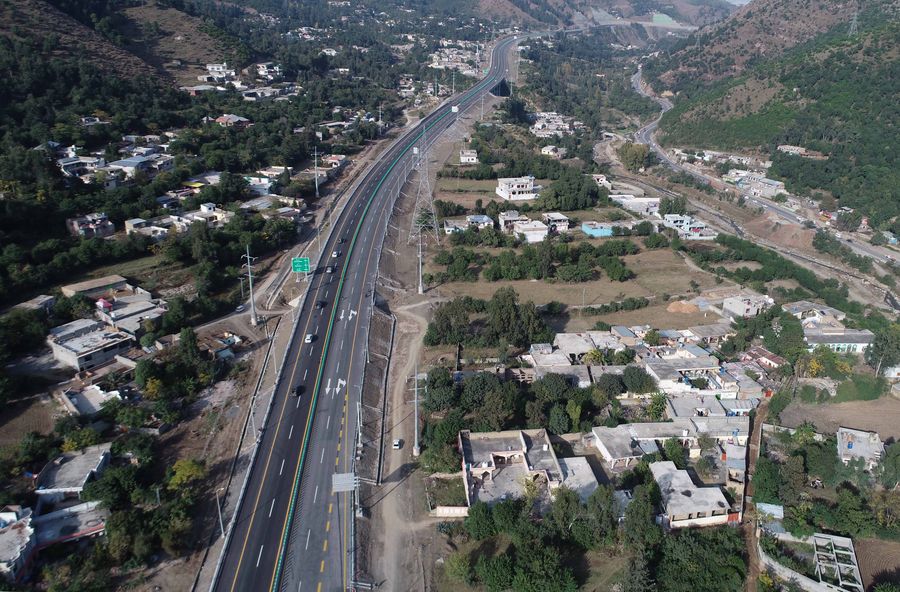
Chinese State Councilor and Foreign Minister Wang Yi (L) speaks at a joint press conference with Pakistani Foreign Minister Shah Mahmood Qureshi in Islamabad, Pakistan, March 21, 2022. [Photo/Xinhua]
By Hannan Hussain
Chinese State Councilor and Foreign Minister Wang Yi on Monday attended the 48th session of the Council of Foreign Ministers of the Organization of Islamic Cooperation (OIC) in Islamabad, and held talks with Pakistani Foreign Minister Shah Mahmood Qureshi.
"No matter what changes take place in the international situation and their respective countries, China will stick to its friendly policy toward Pakistan […] and support Pakistan in defending its sovereignty, independence and territorial integrity," said Wang.
On expanding future cooperation, the message couldn't be clearer: a four-point proposal leads the way, while promising to benefit issues of regional significance.
First, Beijing and Islamabad should continue to extend each other "firm support," according to Wang. His attention to a people-centric development path in Pakistan is particularly promising for the future, because the will of the masses informs China's firm developmental support. These are important determinations for the constant success of the China-Pakistan Economic Corridor, which has positioned itself as an engine of trade and connectivity in the country, aiming to localize development benefits. Islamabad's recent efforts to ramp up industrial cooperation linkages between firms from both sides of the border is also a welcome reminder that Pakistan is determined to reciprocate China's unwavering support, irrespective of changes in the international landscape.

A view of the expressway section of the Karakorum Highway phase two under the China-Pakistan Economic Corridor project in Pakistan, November 18, 2019. [Photo/Xinhua]
When it comes to the international situation, the Ukraine crisis is a case in point. It has revealed a tendency among select Western states to advance support for ideology and bloc politics, and push certain countries to mull a compromise in their bilateral arrangements. It is here that China's reaffirmed support for Pakistan's "sovereignty, independence and territorial integrity" is consistent with how Islamabad regards China's sovereign priorities, eliminating the space for any external maneuvers. Noninterference has been, and will continue to be, front and center of Sino-Pakistan ties.
On Wang's proposal to accelerate common development and revitalization, expanding cooperation from "poverty reduction" to "green development" has several merits. The prospect of synergizing development strategies, for example, could help Pakistan stimulate job growth and improve people's livelihood because early optimism shows in the impact of Belt and Road Initiative in the country.
In similar spirit, cooperating firms from both sides of the border are also engaged in green development projects. As Pakistan's all-weather ally, China wants to see Pakistan embrace a trajectory where the benefits of sustainable economic growth are well received. China's stated commitment to helping Pakistan in fostering "industries, strengthening commerce and revitalizing agriculture," as Wang said, is focused on advancing that same sense of independence and sustainable growth in Pakistan.
The third and fourth points of Wang's proposal called for deeper counterterrorism cooperation, and closer multilateral coordination, respectively. Among many strengths of Sino-Pakistan ties is the importance that Islamabad attaches to the safety and protection of Chinese assets and personnel in the country. Correspondingly, Beijing has made consistent efforts to help improve Pakistan's law enforcement capacity. Monday's talks offered an opportunity to converge both facets under an "advanced security cooperation mechanism."
Finally, enhancing multilateral coordination is of considerable value. After all, both sides are better positioned this way to integrate their common concerns into the regional security discourse especially regarding the Ukraine situation, where unilateral sanctions have raised the specter of spillover effects.
On Afghanistan, both China and Pakistan are vocal advocates of stability in the country, and have translated that support into action through vital humanitarian assistance.
The OIC also has its own place. It serves as a potent reminder of China and Pakistan's increasingly complimentary priorities on peace, justice and development on the multilateral stage. In Wang's own telling, "China and the Islamic world have a strong desire to build partnerships for unity, justice and development." Pakistani Foreign Minister Qureshi also described Islamabad's cooperation with other OIC countries as its "endeavor to shape unified and timely responses" to key challenges for shared benefits.
Thus understood, the China-Pakistan all-weather friendship on the world stage is a manifestation of all three: mutual respect, evolving cooperation and dedicated multilateral outreach.
The author is a foreign affairs commentator .

 中文
中文



